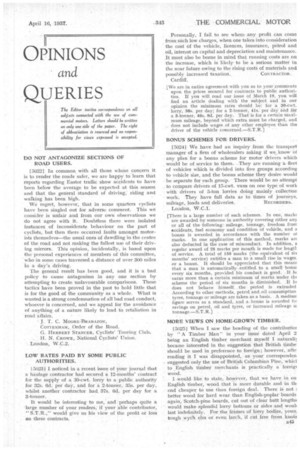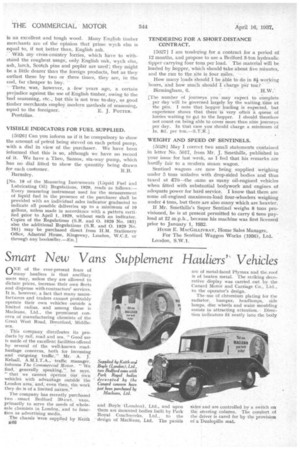OPINIONS
Page 59

Page 60

If you've noticed an error in this article please click here to report it so we can fix it.
and
QUERIES
DO NOT ANTAGONIZE SECTIONS OF ROAD USERS.
[5022] In common with all those whose concern it is to render the roads safer, we are happy to learn that reports regarding Easter traffic show accidents to have been below the average to be expected at this season and that the general standard of driving, riding and walling has been high.
We regret, however, that in some quarters cyclists have been singled out for adverse comment. This we consider is unfair and from our own observations we do not agree with it. Doubtless there were isolated instances of inconsiderate behaviour on the part of cyclists, but then there occurred faults amongst motorists themselves—the usual ones of dawdling in the centre of the road and not making the fullest use of their driving mirrors. This opinion, incidentally, is based upon the personal experiences of members of this committee, who in some cases traversed a distance of over 300 miles in a day's driving.
The general result has been good, and it is a bad policy to cause antagonism in any one section by attempting to create unfavourable comparisons. These tactics have been proved in the past to hold little that is for the good of the community as a whole. What is wanted is a strong condemnation of all bad road conduct, whoever is concerned, and we appeal for the avoidance of anything of a nature likely to lead to retaliation in road affairs.
J. T. C. MOORE-BRABAZ02,T,
COTTENHAM, Order of the Road.
G. HERBERT STANCER, Cyclists' Touring Club.
H. N. CROWE, National Cyclists' Union.
• London, W.C.2.
LOW RATES PAID BY SOME PUBLIC AUTHORITIES.
150231 I noticed in a recent issue of your journal that a .haulage contractor had secured a 12-months' contract for the supply of a 30-cwt. lorry to a public authority for 32s. 6d per day, and for a 2-tonner, 35s. per day, whilst another contractor had. 37s. 6d, per day for a 3-tonner.
It would be interesting to me, and perhaps quite a • large number of your readers, if your able contributor, " S.T.R.," would give us his view of the profit or loss on these contracts. Personally, I fail to see where any profit can come from such low charges, when one takes into consideration the cost of the vehicle, licences, insurance, petrol and oil, interest on capital and depreciation and maintenance. It must also be borne in mind that running costs are on the increase, which is likely to be a serious matter in the near future owing to the rising costs of materials and possibly increased taxation. CONTRACTOR. Cardiff.
[We are in entire agreement with you as to your comments upon the prices secured for contracts to public authorities. If you will read our issue of March 19, you will find an article dealing with the subject and in our opinion the minimum rates should be: for a 30-cwt. lorry, 38s. per day; for a 2-tanner, 41s. per day and for a 3-tanner, 46s, 9d. per day. That is for a certain maximum mileage, beyond which extra must be charged, and does not include wages of any other employee than the driver of the vehicle concernecl.—S.T.R.]
BONUS SCHEMES FOR DRIVERS.
[50241 We have had an inquiry from the transport manager of a firm of wholesalers asking if we know of any plan for a bonus scheme for motor drivers which would be of service to them. They are running a fleet of vehicles which is divided into five groups according to vehicle size, and the bonus scheme they desire would be separate for each group. There would be no attempt to compare drivers of 15-cwt. vans on one type of work with drivers of 5-ton lorries doing mainly collection work. They have full data as to times of journeys,
mileage, loads and deliveries. RECORDERS.
• London, W.C.1.
[There is a large number of such schemes. In one, marko. are awarded by someone in authority covering either any or all of the following: mileage, tonnage, freedom from accidents, fuel economy and condition of vehicle, and a bonus is awarded in accordance with the number oi marks. In one application of this method, marks arc also deducted in the case of misconduct. In addition, a regular award of 25 marks per month is made for length of service. A total of 150 marks (the equivalent of siN months' service) entitles a man to a small rise in wages, or a bonus. It should be appreciated that this mean! that a man is automatically.-entitled to a small bornu! every six months, provided his conduct is good. If is earns more than a certain minimum of marks under at scheme the period of six months is diminished. If In does not behave himself. the period is extended According to other methods, petrol and oil consumption tyres, tonnage or mileage are taken as a basis. A mediuir figure serves as a standard, and a bonus is awarded fol savings on petrol, oil and tyres, or increased mileage oi tonnage.—S.T.R.]
MORE VIEWS ON HOME-GROWN TIMBER.
[5025] When I saw the heading of the contributioi by "A Timber Man" in your. issue dated April 2 being an English timber merchant myself I naturallIc, became interested in the suggestion that British timbe should be used in preference to foreign; however, afte reading it I was disappointed, as your corresponden suggested only the use of British Columbian Pine, whiel to English timber merchants is practically a foreigi wood.
I would like to state, however, that we have in ou English timber, wood that is more durable and in th, end cheaper to use than foreign deal. There is not ; better wood for hard wear than English-poplar boards again, Scotch-pine boards, cut out of clear butt lengths would make splendid lorry bottoms or sides and woulc last indefinitely. For the frames of lorry, bodies: yours; tough wych elm or even larch, if cut _free from knots is an excellent and tough wood. Many English timber merchants are of the opinion that prime wych elm IS equal to, if not better than, English ash.
With my cross-country lorries, which have to withstand the roughest usage, only English oak, wych elm, ash, larch, Scotch pine and poplar are used; they might be a little dearer than the foreign products, but as they outlast these by two or three times, they are, in the end, far cheaper to buy.
There was, however, a few years ago, a certain prejudice against the use of English timber, owing to the bad seasoning, etc., but this is not true to-day, as good timber merchants employ modern methods of seasoning,
equal to the foreigner. E. J. POTTER. Pontrilas.
VISIBLE INDICATORS FOR FUEL SUPPLIED.
1.50261 Can you inform us if it be compulsory to show the amount of petrol being served on each petrol pump, with a dial in view of the purchaser. We have been informed that this is so, although we have no record of it. We have a Theo, Samoa, six-way pump, which• has no dial fitted to show the quantity being drawn
for each customer. R.B. Barnsley.
[No. 19 of the Measuring Instruments (Liquid Fuel and Lubricating Oil) Regulations, 1929, reads as follows:—
• Every measuring instrument used for the measurement of liquid fuel in the presence of the purchaser shall be provided with an individual sales indicator graduated to indicate all possible deliveries up to a minimum of 10 gallons, unless made in accordance with a pattern certified prior to April 1, 1929, without such an indicator. Copies of the Regulations (SR. and 0. 1929 No. 183) also the additional Regulations (S.R. and 0. 1929 Nn. 751) may be purchased direct from TIM. Stationery Office, Adastral House, Kingsway, London, W.C.2, or through any, bookseller.—En.]
TENDERING FOR A SHORT-DISTANCE CONTRACT.
[5027] I am tendering for a contract for a period of 12 months, and propose to use a Bedford 3-ton hydraulic tipper carrying four tons per load. The material will be loaded by hopper, which should take about five minutes, and the run to the site is four miles.
How many loads should I be Ole to do in 84, working hours, and how muah should I charge Per ton?
Birmingham, 6. H.W.
[The number of journeys you may expect to complete . per day will be governed largely by the waiting time at the pits. I note that hopper loading is expected, but experience shows that there is Very often a queue of lorries waiting to get to the hopper. I should therefore not count on being able to cover more than nine journeys per day. In that case you should charge a minimum of Is. 8d. per ton.—S.T.R.]
WEIGHT AND SPEED OF SENTINELS.
(5028] May I correct two small statements contained in letter No. 5017, from Mr. J. Smethills, published in your issue for last week, as I feel that his remarks are hardly fair to a modern steam wagon.
Sentinel wagons are now being, supplied weighing under 5 tons unladen with drop-sided bodies and thus taxed at L70—the same as many oil-engined vehicles when fitted with Substantial bodywork and engines of adequate power for hard service. I know that there are some oil-engined maximum-load four-Wheelers. weighing under 4 tons, hut there are also many which are heavier.
If Mr. Smethills's Super Sentinel weighs 8 tons provisioned, he is at present permitted to carry 6 tons payload at 12 m.p.h., because his machine was first licensed prior to January 1, 1932.
HUGH E. MACGILLIVRAY, Home Sales Manager,
For The Sentinel Waggon Works (1936), Ltd. London, S.W.1.




























































































